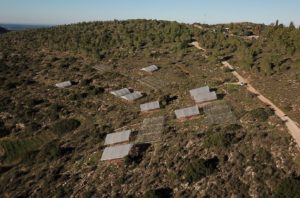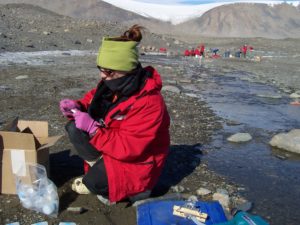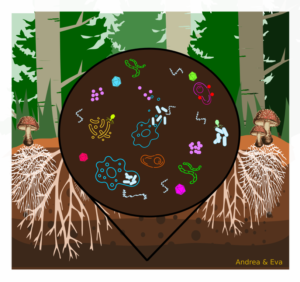The Long Term Ecological Research (LTER) Network Office is pleased to announce the award of three new synthesis working groups to launch in 2020. Working with data from multiple LTER sites as well as other research networks, the synthesis projects will look for larger patterns than what may be evident at a single site. Long-term, multi-site studies are thought to be among the most effective approaches for developing general theories in ecology and evolutionary biology (Kuebbing et al 2018), and the selected projects have great potential for uncovering and testing general theories in several key areas:
Long term drought—which is increasing in frequency and intensity—doesn’t simply affect growth and productivity. It also changes the mix of species, which can have many effects that are difficult to anticipate. A global synthesis of multi-year drought effects on terrestrial ecosystems builds on a distributed network of over 100 experiments to understand direct and indirect effects of short- and long-term drought. With such a large and extensive range of sites, the analysis is likely to produce insights will help model and predict drought impacts and aid land managers in identifying and planning for vulnerabilities.
Silicon is essential for the growth of diatoms, which account for a quarter of global primary production, yet our understanding of the controls on silica mobilization and transport is limited. A multi-biome synthesis investigating the controls on river Si exports will analyze data from several LTER sites as well as Critical Zone Observatory sites and US Geological Survey sites—together spanning tropical, temperate, Arctic and Antarctic rivers—to understand the roles of terrestrial vegetation, in-river productivity, and climate in controlling the movement of this important nutrient.
Modern DNA sequencing techniques often reveal hundreds to thousands of species in a single sample. Yet interpreting the significance of this information—and using it to predict changes in ecosystem functioning—depends on the ability to connect it with ecological conditions and processes. The Ecological Metagenome-derived Reference Genomes and Traits (EMERGENT) synthesis project aims to develop a way forward to explore large genomic information typically stored in data centers (NCBI, EBI, DDBJ) and the repositories (Environmental Data Initiative, NEON and others) where the ecological data is maintained.
The three successful projects were selected by a panel of LTER and non-LTER researchers out of a field of 13 proposals and will begin their work over the next few months. In addition to travel and meeting support, they will receive training and assistance with reproducible research techniques and best practices for collaboration. The LTER Network Office expects to hold additional competitions for synthesis working groups in 2021 and 2023.
A global synthesis of multi-year drought effects on terrestrial ecosystems
PIs: Kate Wilkins (CSU), Osvaldo Sala (ASU/JRN), Peter Wilfahrt (University of Bayreuth), Laureano Gherardi (ASU/JRN), Melinda Smith (CSU/KNZ)

Researchers use rainout shelters at the Matta International LTER site in Israel to simulate extended droughts and observe changes in ecosystem productivity and species composition.
Credit: Image courtesy of International Drought Experiment
Drought impacts on terrestrial ecosystems have increased globally over the last century with models forecasting that droughts will become more frequent, extreme, and spatially extensive. The goals for this project are to synthesize results from a unique global network of drought manipulations, focusing on how ecosystem productivity responds to drought over time and key mechanisms (changes in plant composition) underlying these impacts. We propose to host a series of working groups to synthesize an existing multi-year dataset from the International Drought Experiment (IDE). The IDE is a coordinated, global network of extreme drought experiments at >100 sites, including eight LTER and four ILTER sites. The objectives for these synthesis meetings include: 1) analyzing how short-term drought affects ecosystem sensitivity patterns (i.e. the relationship between plant production and precipitation), 2) identifying how aboveground productivity and plant species composition (abundance, richness, evenness, re-ordering) change in response to a 4-year drought, and 3) determine how shifts in plant species composition indirectly affects the sensitivity of productivity to drought over time.
From poles to tropics: A multi-biome synthesis investigating the controls on river Si exports
PIs: Joanna Carey, Babson College, and KathiJo Jankowski, US Geological Survey

The Von Guerard stream at the McMurdo Dry Valleys LTER site represents one extreme of the poles-to-tropics extent encompassed by the Si in streams synthesis project.
Credit: Barb Woods, MCM LTER
Riverine exports of silicon (Si) directly influence global carbon (C) cycling through the growth of diatoms, ubiquitous autotrophs in marine and freshwater systems, which account for ~25% of global primary production. Rivers play essential roles in processing and supplying the Si necessary for diatom growth, but we have limited knowledge of the controls on river Si exports, especially how they vary across biomes. Prior work has shown conflicting importance of various drivers, such as lithology, riverine productivity, and terrestrial vegetation in controlling river Si exports. Capturing a baseline understanding of how these factors influence Si exports across biomes is essential for understanding freshwater and marine C cycles, especially during this period of rapid climatic warming. This synthesis will answer three specific research questions related to the roles of 1) terrestrial vegetation, 2) river productivity and 3) climate warming in controlling river Si exports across biomes. Our proposed sites span the globe (e.g., Antarctic, tropical, temperate, boreal, alpine, Arctic systems), and present a unique cross-network opportunity to connect LTER-based research with that of the Critical Zone Observatory and USGS. Together, we will create the first data-driven predictive framework of how riverine Si exports will respond to global change.
Ecological Metagenome-derived Reference Genomes and Traits (EMERGENT)

The Ecological Metagenome-derived Reference Genomes and Traits (EMERGENT) synthesis project connects genomic information about the soil microbiome with the broader ecological context.
Credit: Image credit: Andrea Dame and Eva Tipps
PIs: Jeffrey Blanchard, UMass Amherst; Janet Jansson, Pacific Northwest National Laboratory; Jorge Rodrigues, UC Davis; Lee Stanish, NEON; Margaret O’Brien, US Santa Barbara, EDI; Jason McDermott, Pacific Northwest National Laboratory
Our climate crisis, resulting from changes in interacting climate variables (temperature, rainfall, atmospheric chemistry) over the last century, has impacted all ecosystems on the surface of the Earth. With modern DNA sequencing techniques it is now possible to simultaneously sample thousands of different species, providing a window into the diverse soil organismal community and their ecological traits. While often the sequence data is stored at international nucleotide sequence data centers (NCBI, EBI, DDBJ), these databases do not have the resources to process and integrate microbiome data. This results in the compartmentalization of studies, failure to effectively utilize data across sites, and repetitive development of similar analytical pipelines across multiple research groups. Our working group proposes to alleviate some of these bottlenecks to make greater use of the existing genetic data to address climate related-questions and provide reference species (genomes) for future research. Our work will advance efforts to harmonize molecular information for microbial taxa and their functional traits, streamline their use in syntheses with related ecosystem level data, and enable future metagenomic studies to leverage EDI environmental data, spurring future microbial ecology research at LTER sites.










